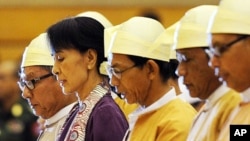Burma’s elected democratic opposition has been sworn into office in a ceremony in parliament marking an historic turn in the country’s military-run politics. But analysts say the opposition has little power and a lot to learn about politics.
In a scene that would have been unthinkable just months ago, opposition leader Aung San Suu Kyi and other elected members of her National League for Democracy officially took their seats Wednesday in parliament.
In a special morning ceremony in the capital, Naypyitaw, they read an oath they had previously disputed (and pledged) to safeguard the military-drafted constitution.
Aung San Suu Kyi told reporters she had tremendous good will toward the military, despite the opposition desire to reduce its power and presence in the parliament.
“We would like our parliament to be in line with genuine democratic values," she said. "It is not because we want to remove anybody as such. We just want to make the kind of improvements that remain - a national assembly, a truly democratic one."
The ceremony was delayed following the NLD's landslide win in the April 1 by-election, because it wanted the wording of the oath changed to say “respect” the constitution. The NLD wants to change the charter to give less power to the military, now guaranteed a quarter of parliament seats and the legal authority to take power in cases of national emergency.
But Aung San Suu Kyi announced Monday the NLD gave up its demand in the interest of moving politics forward.
Analysts say the opposition has a lot to learn about politics. Aside from amending the constitution, the NLD has only vague platforms of supporting rule of law, peace with ethnic rebels, and development.
Vahu Development Institute analyst Aung Thu Nyein says the NLD is still a party of activists, in need of help with political strategy.
“But one of the strong points for the NLD is they got popular support," said Aung Thu Nyein. "It is not that difficult [for] the NLD to organize a kind of consultative section - maybe retired bureaucrats or the other economists, academics and the other strategists.”
Despite its April election win, the NLD has less than eight percent of seats in parliament, giving it little power to pursue its agenda. But observers say almost universal respect and support for Aung San Suu Kyi and the NLD gives them leverage.
The director of the Institute of Security and International Studies at Bangkok’s Chulalongkorn University, Thitinan Pongsudhirak says expectations are high for the opposition and reform-minded President Thein Sein.
“At the same time the expectations will also put pressure on the Thein Sein regime and the generals in the background," said Thitinan Pongsudhirak. "They must know that all eyes in the international community, in the region, and domestically are focused on them.”
Burma’s military has ruled the country since 1962. In 2010 it held flawed elections that sidelined the NLD, but brought a nominally civilian government to power.
President Thein Sein, a former general, then surprised critics with a series of reforms that have led Western governments to suspend and lift sanctions against Burma.
He met directly with Aung San Suu Kyi, who was released after 15 years of house arrest, and allowed the NLD to contest the April election.
Although the NLD is now the official opposition in parliament, little political debate is expected until the legislative session resumes in July.
Next month, Aung San Suu Kyi is expected to take her first overseas trip since her release. She will travel to Norway to be honored for the Nobel Peace Prize she was awarded in 1991, when the military was still holding her under house arrest.




